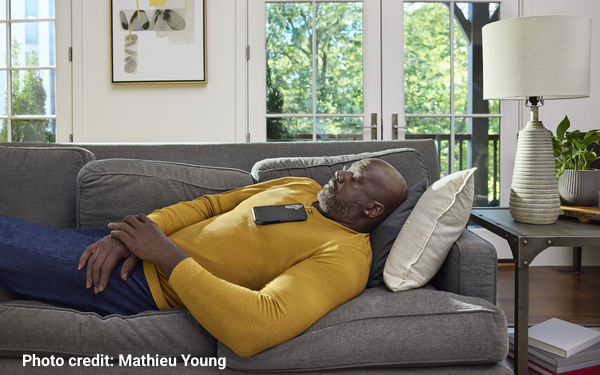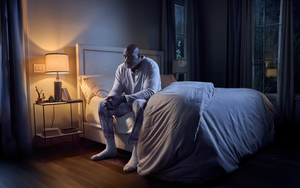
Shaquille O’Neal has obstructive sleep apnea (OSA).
We know that because he’s teamed with Eli Lilly on an unbranded awareness campaign called “Don’t Sleep on OSA.”
We also know that Lilly, since last December, has
offered the only FDA-approved drug to treat moderate to severe OSA in adults with obesity, and it's a name you already know: Zepbound, usually used just for obesity.
But, after a conversation
earlier this week with Eli Lilly’s Lina Polimeni, recently promoted to Lilly’s CMO, Consumer, we still don’t know if O’Neal has used Zepbound to treat his OSA. We also
don’t know of any Lilly plans to advertise Zepbound directly to OSA patients.
That’s because of “regulatory” restrictions in discussing unbranded and branded campaigns
in the same conversation, JohnMark Conklin, a Lilly communications senior director, told us.
advertisement
advertisement
So here’s what we do know:
Lilly for some months has been running what appears to be
the first-ever OSA awareness advertising campaign by a pharma company. (Previous ones have been run by nonprofits.).
O’Neal joined the effort in late October, highlighted by a :30 spot from IPG Health’s FCB Health New York that Polimeni says will run at least through
year’s end. In it, a voiceover states that people have called the legendary NBA star “superhuman.” Then, while he’s shown doing chores like taking out the garbage
and trying to open a pickle jar, O’Neal says that "like nearly 24 million adults, I struggle with moderate obstructive sleep apnea.” O’Neal tells viewers that if they have symptoms
like “breathing interruptions during sleep, loud snoring, choking, and daytime fatigue, they should talk to their doctor… because there’s nothing superhuman about ignoring OSA
symptoms.”
The spot is running on broadcast, social, and Netflix, via ads that show up when viewers pause the content they’re watching.
Beyond the paid ad campaign,
Polimeni says that O’Neal will be doing outreach through his own social media and in earned media
interviews designed to “get the conversation in the mainstream cultural conversation.” One campaign goal, she says, is to “bring awareness around not just the disease itself, but the
relatability of the symptoms.”
One of the “simple” symptoms that’s more easily overlooked is daytime fatigue, exhibited by O’Neal in the TV spot, which Polimeni
says could signal that “the prior night’s sleep has been disturbed.”
All ads direct users to DontSleepOnOSA.com, a website that, in keeping with Lilly’s principles,
includes absolutely no Zepbound links that we could find.
Instead, the campaign urges users to speak with their doctors about symptoms. It also provides a “Find a Doctor” link,
which offers the option of contacting telehealth provider Ognomy Sleep or a local specialist via Healthgrades.

The typical demographic of people being diagnosed with OSA are men in their late 40s to
early 50s, often “overweight or living with obesity,” Conklin says. But, he adds “we also know that the partner plays a significant role in their diagnosis, so from a media
perspective, we’re trying to reach both [sexes].”
In O’Neal’s case for instance, Polimeni says he did not understand initially how his symptoms were related to
obstructive sleep apnea “until it was pointed out by loved ones and he then talked to a doctor” who came with “a comprehensive care plan for him.” All that’s known about
Shaq’s treatment is that used a CPAP machine at night, as shown in this Harvard Medical School video from 2011, and also a
snoring device for Zyppa, for which O’Neal starred in an ad campaign six years ago,.
Polimeni says that
Lilly’s decision to partner with O’Neal was because of the star’s relatability: He not only “has a huge following and huge influence on people, but he has been diagnosed
and is a patient. If there’s any stigma around this disease, they can hopefully feel that if somebody like Shaquille O’Neal is experiencing these symptoms, it’s okay for them to
experience them too.”
As for Zepbound, while Lilly has yet to launch a consumer campaign around the drug’s OSA indication, we did want to take this opportunity to disseminate news
of other Zebound developments not discused with Polimeni.
One is LillyDirect’s recent agreement to let online purchasers of Zepbound single-use vials pick up their orders at their local
Walmart pharmacy.
And on Nov. 14, Lilly is opening a pop-up in New York, featuring “Queer Eye” star Tan France that will showcase Zepbound’s “Changing the
Threads” fashion collection. It’s said to showcase the “power of art and science colliding to unveil authentic stories of adults living with obesity embroidered into
clothing.”
As reported in the New York Times a week ago, President Trump also announced an agreement that would ostensibly cut prices dramatically for both Zepbound and Novo
Nordisk’s Wegovy for those whose insurance (mainly Medicare and Medicaid plans) don't currently cover those obesity drugs.